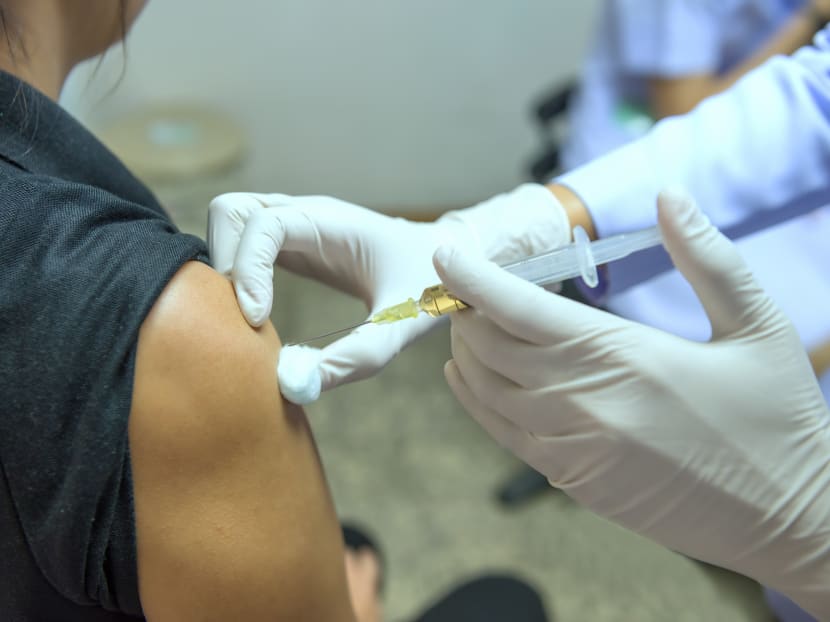MOH reiterates call for healthcare workers to be vaccinated against whooping cough
SINGAPORE — With the number of whooping cough cases on the rise, the authorities have renewed their call for healthcare workers looking after young children to be vaccinated against the disease, which is potentially deadly for babies less than a year old.
SINGAPORE — With the number of whooping cough cases on the rise, the authorities have renewed their call for healthcare workers looking after young children to be vaccinated against the disease, which is potentially deadly for babies less than a year old.
The Ministry of Health (MOH) first made the recommendation in 2014. That year, there were 21 confirmed cases of whooping cough, also known as pertussis.
Since then, figures have shot up to 57 in 2015 and 85 in 2016. Last year, there were 79 reported cases, although doctors told TODAY the figures may be the tip of the iceberg owing to the relatively high cost of a swab test to confirm whooping cough.
The highly contagious respiratory disease is caused by the Bordetella pertussis bacterium. According to the United States’ Centres for Disease Control and Prevention, it causes violent coughing fits, after which a person often takes deep breaths that result in a “whooping” sound.
Whooping cough is transmitted via respiratory droplets or direct contact with the nasal or throat secretions of an infected person, the MOH said.
“All healthcare workers who come into contact with newborns and infants are recommended to receive one dose of pertussis vaccination … if they have not been previously vaccinated. Our healthcare institutions monitor vaccination coverage of healthcare workers, to ensure optimal protection against pertussis,” an MOH spokesperson said in response to TODAY’s queries.
The MOH did not share how many healthcare workers have been recommended the vaccine or the proportion of them already vaccinated.
Besides the vaccine for pertussis — called Tdap (tetanus, diphtheria and pertussis) — healthcare workers are recommended to get vaccinated against hepatitis B, influenza, varicella, and measles, mumps and rubella, among others.
Newborns and infants who are not vaccinated against whooping cough are at greatest risk of infection.
The majority of reported cases here are infants under six months old.
Consultant paediatrician Liew Woei Kang, who sees two to three whooping cough cases a year, said the most serious case he has treated is a four-month-old child who is currently in the intensive care unit with severe pneumonia, where he requires intubation and ventilatory care.
“He was unfortunately not vaccinated and had other medical issues that delayed vaccination,” said Dr Liew, who specialises in paediatric allergy and immunology at the SBCC Baby & Child Clinic in Gleneagles Medical Centre.
Children in Singapore are vaccinated against pertussis under the National Childhood Immunisation Programme. Infants are given three primary doses at the ages of 3, 4 and 5 months. Booster doses are given when the child is 18 months old, and again between 10 and 11 years old.
On the importance of healthcare workers being vaccinated, Dr Liew said: “As adults, our immunity against pertussis and other germs would wane with age. Most would have their last pertussis booster (dose) at 11 to 12 years old. Hence, you may be infected by your patients and spread it to others.”
While the disease is common in adults, it is usually mild.
Dr Ong Kian Chung, a respiratory medicine specialist at Mount Elizabeth Hospital, said confirming the infection was difficult as the initial symptoms are similar to the flu. At about S$500, a swab test to confirm whooping cough is also costly.
However, whooping cough cases can drag out for up to three months. Some of Dr Ong’s patients coughed so violently they fractured their ribs, had urine incontinence and had to absent themselves from work for up to three months.
Treatment consists of antibiotics and drugs that reduce the cough after the acute infection period, said Dr Ong.
Besides healthcare workers, the MOH also recommends the Tdap vaccine for pregnant women at between 16 and 32 weeks of their term. This is to protect their newborn after birth.
The ministry advised pregnant women to consult their obstetricians on their vaccination needs.









